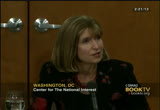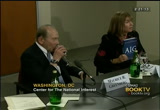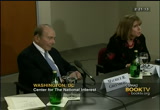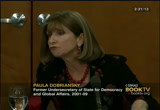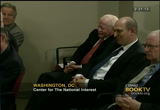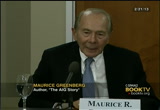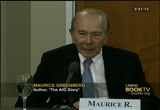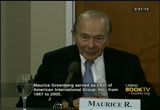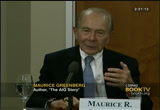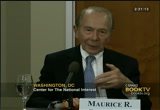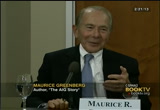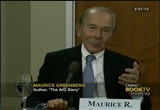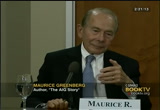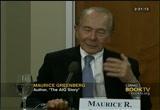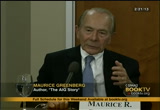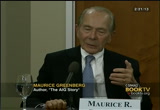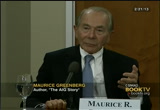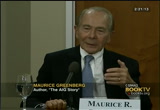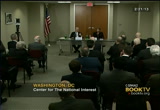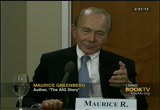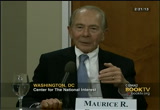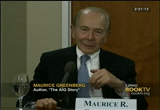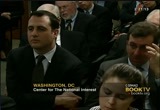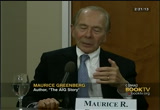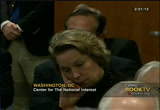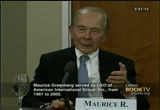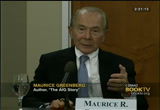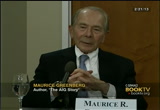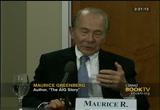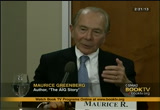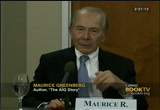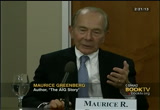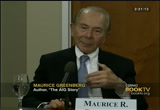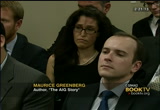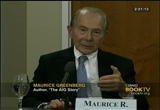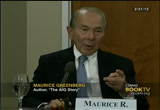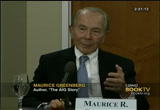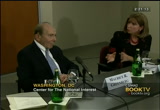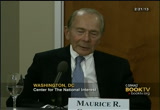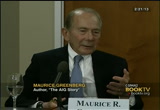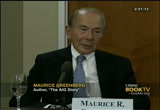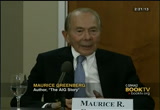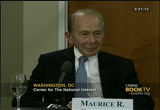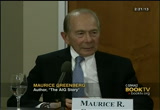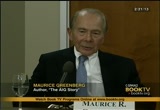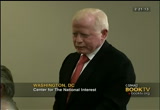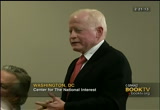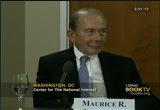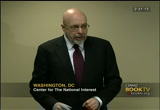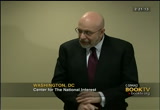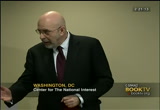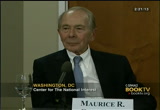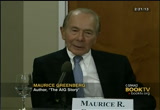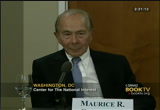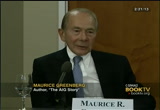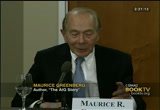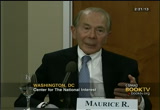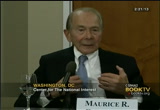tv Book TV CSPAN March 9, 2013 9:00pm-10:00pm EST
9:00 pm
>> all right. well, good evening to all of you. i think we'll get underway. first, i'd like it welcome you to the center for national interest, and i'd like to thank its president for bringing us together this evening. thank you for that. i'd like to welcome hank greenberg to the center. he's its chair, and i first, in that regard, want to thank you for your dedication to the center for many years.
9:01 pm
starting at its creation and its development and advancement, you've devoted time, energy, passion, and substance, really, to the center, and now as it is, center of the national interests, and, really, thank you for that. hank grenberg also not only made substantial contributions to this center intellectually and in many capacities, but he also, as i think a number of you know in the audience, also made a substantial contribution when you were vice chair, and i had to mention that because i happened to be the head of the washington office of the council on foreign relations, and my first meeting with hank, by the way, was an interview. those of you who know les, the president at the time of cfr, and peter ryckboscherson was -- petepete peterson was the chair.
9:02 pm
we sat out hank's office, and les put the fear of god in me because he said we're going in to meet with hank, a renowned businessman, made a tremendous mark on the development and rise of aig, and you know what? he's very direct. he's very snappy. time efficient. no nonsense, and, you know, he'll look you right in the eye, and he told me, make sure that you are direct, look him right in the eye, and get to the point. i said, les, i will. well, the good news is i got the job. that was my introduction to hank greenberg. well, as you know, today, we're gathered to mark and congratulate, if i may say, hank, on his book, "the iag story," and the book, i think, really underpins what hank is about. in fact, i like very much henry
9:03 pm
kissinger's inscription in the back talking about your being truly a major figure in the american business in the 20th century, someone who is principle, strongly committed, and does not waiver on one's principles in o time of crisis. i think this story really undergirds and sub stanuates that. the book is not only a chronicle of his personal story starting with his departure of being an army officer in the korean war, and his entry into the insurance industry with continental casualty company, but then going on to become the head of and ceo of a, -- aig, bringing it to what became, literally, thee largest insurance company in the world with almost over a trillion dollar worth of assets.
9:04 pm
there's a personal side, but there's also the other side of the story, which is a very instructive one, and one in which we're going to probe with you, especially today. that is the substance side of the book which specifically set forth very profound questions, profound and serious questions about government regulation in the financial industry. what are the unintended consequences of this regulation and what it does actually. as in this case, we witnessed the rise and fall of aig. what did touse on the personal level, to the organization, and, in this case, to a business that was truly a national asset to the united states -- for the united states. this is the motion-read, and with that, i want to turn it to hank. please join me in welcoming him here today. [applause]
9:05 pm
>> thank you very much. i want to recognize demetri who is a champ who really made this organization go. i live in new york city. he's here in washington. that's where the organization is, and i tried to get, talk quite frequently, but he's the man that's built this organization so no misunderstandings about that. i also wanted to recognize ambassador from the philippines. we worked together for many years. he ran one of our biggest companies in the philippines, and i'm delighted that he's been recognized to be the ambassador to the united states, and now in writing this book, there was --
9:06 pm
there were hundreds of thousands of people at aig who worked with me for years, and i believe that their story had to be told, how did we get from when we went public, we went public, at $300 million of market central. when i left at the end of march 2005, it was $180 billion. we had great growth, and that was accomplished by many, many people, and their story had to be told, many left aig, and i'll get into that in a moment. aig was an outgrowth of the star companies. this is a small collection of insurance company. the founder put it together. i joined him, and after several years, we succeeded. added several small companies
9:07 pm
for a big one several years later called a iring's g. the star companies were not part of aig. they founded it. they were kept out because they were too small to really put into aig, and i'm very thankful that we did that. [laughter] it made no sense, but it grew rapidly. there was several things in our genes that made us grow from where we were to the the largest insurance company in history. obviously, it was the people, but want to call us mavericks, we were that. we were innovative. we broke with the typical traditional insurance type of underwriting where most of the business was either automobile other homeowners, very little growth in anything that was new. all the large riffs went to
9:08 pm
london, and we believed we should be a market in the united states. that really could clish -- accomplish that. that was the general insurance. on the life insurance side, there was a company in the philippines that didn't stay small for long. it became a huge company in the fill peeps, as we did with other companies. there was alaco, on the parted in many, many countries around the world, and so we brought a new business to the business industry, both in products innovation, and management structure. we learned something that didn't work, and it was a great company that never worked. most companies had an agency department and an underwriting department. at the end of the year, they fought.
9:09 pm
if they lost money, one blamed the other, and that just went on and on and on. we introduced a profit structure where one person in charge of the products, the marketing of it, and you knew who was accountable. there was no braving anybody educational. it was your accountability. that structure was so embedded in aig thinking that the people who understood it stayed with the company. those who couldn't live if that structure, didn't want to be held accountable with the competitors. that made us stronger and then weaker, and it worked quite well. this operated worldwide. there was a culture in the company that, you know, it doesn't -- culture doesn't happen automatically. you create a culture in the company, and the culture we had was a winning culture.
9:10 pm
seeing your people work together very well, and the board of directors initially of aig was made up of mostly inside people who were running the company outside people, obviously, and very fine people at that time. all of that changedded when -- so the first part of the book touches on that, but the show really -- what we meant to the country overall, and a couple vignettes i'll just talk about briefly. there was a book written on something called the glow mo marine, a book about a russian sub that went down in the northwest pacific, and the russians didn't know where the hell it was. they looked and looked, counterfind -- couldn't find it. u.s. knew exactly where it was, and wanted to recover it because it was a nuclear sub, the code
9:11 pm
books were important and the technology was important. it was decided they would try to recover the sub. there was a meeting with the general council of the cia, his deputy, and the deputy of howard hughes, because if we're going to do that, they had to build a vessel, a very large vessel with a hole in the center that would scoop this sub up, and you had to think about what if the russians decided what we were doing was looking for that sub and knew where it was. what happened if they fired on us? where would you bring this sub? couldn't bring it to hawaii. you know, what do you do? put it on the beach? that was not going to work, and so they had to find a pacific island that was obviously in u.s. possession, build a port,
9:12 pm
and discharge it there. we provided the insurance for that operation. there were not many companies that would have the vision or the skills, the underwriting skills to take on a project like that. i happen to be, you know, the operation was going on, i was in hong kong, actually, at a board meeting of aig, taking them around asia, had a call when the los angeles times broke the story. during the course of the recovery, and, obviously, that didn't -- that didn't provide the kind of information we had, even if you got technology out of if you thought they had or didn't have. one example of aig's value to
9:13 pm
the country. there are many, many stories like that. i was asked by very high government officials to go out and meet with president marcos who i knew very well because we had long relationships, and he served more terms as president than he was either permitted by law. he -- he declared marshall law and was going to stay as long as he was alive. the country was rested, a revolution was possible. marcos was ill. he was on dialysis. i did go out and admiral long, who had been the head of the naval forces in the pacific had just retired, came along with me. also john reid who had been the
9:14 pm
head of citigroup at that time, they had a big operation in the philippines. i did go out, and we had dinner with the president, and i decided to wait until dinner was over. [laughter] you want to step down, step down at the top of the game rather than lose. i'm not going to lose. i'm going to win the election. nobody would believe that. you know, who's going to believe that? the country is restless. you over stayed. step down while you can. he said, no, you're wrong. what happened? he went on. the election went on. uprises in the country. things went all to hell. u.s. took him out by helicopter and a plane and flew him to hawaii where he subsequently died. now, how many insurance companies that you know of
9:15 pm
provide those kinds of services to the country? [laughter] yeah. there were many, many others. that's not the point of the book. the point of the book was to say how different we were and how valuable an asset we were to this country, and the thousands of people that made that possible. the second part of the book is what happened? we had a -- we had in new york, now a disgraced attorney general , who decided that there was a law on the books of new york called the martin act. it was enacted in 1921. it was designed to go after bootleggers. it was one who dug -- the staff dug it out. it's silent as to intent. if you can accuse somebody of a
9:16 pm
fraudulent act, he took the position enough to prove intent. you can go after anybody who's made a mistake in something or other and force him into submission or to go to trial. he used that against many companies who threw their hands up and just agree to settle with him and paid huge fines. i couldn't do that. what happened, people after me, there's two things i would mention. win, i was on a conference call with curet analyst -- security analysts, and one asked me what's the regulatory environment like today. this is after now, enron, when there was a seat change of regulation in the united states. i said a foot fall is like a
9:17 pm
murder charge, trying to explain the severity of the change in the regulatory environment. it did change. sarbanes-oxley brought about enormous change in corporate governance, and companies felt vulnerable, and so they all went to their own lawyer representing them, and what happened is that ceos of companies were really downgradeed in the management of an institution. in some cases, it may have been good. many many cases, it was nod got. when a board is trying to really run a company that's operating in 10 countries where the management knows moment to moment what's going on directors come, you know, four times a year, and no matter how dill
9:18 pm
janet they are, it's rather difficult for them to have a detailed knowledge of what it is to take to run that company. the management of aig traveled constantly, on the road constantly, and regional executives, the reporting was on a realtime basis. i could tell aig results by two days. i would know anything i wanted to know about the company. it was a realtime basis, so, you know, throughout a quarter, we would know how we were doing in every part of the world we operated in, so when there was a -- in the year 2000, we had consolidateed a reinsurance company we started actually
9:19 pm
years before, a thing with 40% interest, and it went up to over 50% in that year. i just came back from app overseas trip trying to catch up and senior managers, what was happening in their areas, and one said we're going to show reductions and reserves in the quarter. we have about 25 billion of prosecute casualty reserves that could be down 55-odd million in the end of the quarter down to 25. that means when you're paying claims, it goes from reserve to pay. that's the normal process. if you pay it, you pay that and the reserve comes down. the transatlantic drsh -- excuse me -- that we just consolidated paid losses, down 40 odd million of the 56 #
9:20 pm
million. now, that's an inconsequential number. it's a nothing. they said let's get a finite reinsurance treaty which essentially says you get, and this is common in the insurance industry, premiums and losses from a reensurer for a finite period of time. in order to be counted as reinsurance, it has to have a 1% risk factor, 1%, and so we got 500 million of premium in 500 -- whatever the number was of lost reserves, from general, a warren buffet company. they happen to be the largest reinsurer, and so it was logical to talk about them, and so i
9:21 pm
made a call to the president who i knew well, ron ferguson, a very honorable guy, and he said he would check, see if they had the proper portfolio. he got back with me several days later saying, yes, we can do this, and i have out of there after that. the staff took all of the -- do about 40 million things a year, so, you know, i have people follow up on all of that. there was a company in virginia that had done a transaction that led to that company's bankruptcy. two went to jail called on medical malpractice insurance companies. they were asked, did you do any of the other deals? he referred back to the transaction we did five years ago, which was approved every year by the auditors, and gave
9:22 pm
giving them all the transactions that they had done. he jumps op this transaction. he didn't know reserves from premium. you could talk about baseball. that would have been the same thing to him. he had no knowledge of that, but he used that to bludgeon the board, and my friend, dear mr. cone, on the board at the time, and a standup person i might say, he and carter hills on the board, probably the only two who fought this silliness that was being presented. the ordnance who approved this for five years in a row withdrew their approval.
9:23 pm
in other words, don't sign off on year end results. that caused a little shakiness for the guys in the company. we were an aaa rated company. we had the highest rating. we had a growth pattern that was the end vie of the whole industry. it was clear that he was going to demand my head, and this change in corporate governance referred to really became a great example of what happened to the destruction that it led to was just unbelievable. there was a meeting held on the upper with one the lawyers uptown, and a good friend of his, a jogging partner, and the
9:24 pm
other lawyer firm, a corporate lawyer. he had been an associate to that firm. it was really even handed. you can tell. they had a meeting an decided i should step down. i was going to step down the ceo in may at the annual meeting. this was in march. i was going to remain as the chair for a couple of years to see how the transition was going to work, which i thought was a reasonable thing to do. they demanded i leave then, that i could remain as chair until the annual meeting, and i said, no, i wouldn't do that. they came back, and said, you can stay as chair. i decided i had to make a trip to malaysia and to china, and i
9:25 pm
decided on that trip i was not going to remain as chair. david boies represented me wrote a letter for my resignation. now, i know that bill asked the auditors, for example, did this transaction affect shareholder's equities or earnings? he said, no, doesn't affect that. you approved it for five years in a row. well, we can't do that now. we're going to withdraw approval. it was clear they were getting pressure from the national officer, and the national officer pressure from spitzer. don't even ask -- well, just circle that and don't approve that had no effect on earnings so what's the different? he wouldn't do it. it was clear when it was over.
9:26 pm
i left the company. they then paid spitzer a billion 600 million dollar fine. okay? that led then to class action suits for several billion dollars more. you think about what this man did. he went on national television and accused me of criminal fraud without ever having indicted me or presenting any evidence that i did anything wrong. john whitehead wrote an op-ed in the "wall street journal" commenting how can an attorney general do this to one of america's leading ceos? spitzer called him and threatened him after that.
9:27 pm
clearly, what happened in corporate america is boards lost enormous power, ceos lost enormous powers, boards took over more and more responsibility. now, is that good for american business? is that good for the economy? that's one of the reasons i've run this book because i do think that we're at a cross roads. i think it's disgrateful for what they've done. i wouldn't settle for a dime. they tried to get me to settle any number of times. i will not do that. right now -- we're in the court of appeals now, the highest court in new york determined whether or not the martin act, as currently written and used is constitutionally proper. it can't be. it can't be. you have to prove that you did
9:28 pm
something wrong. you have to prove intent. i was so far away from the transaction, the justice department looked at me for five years, for five years and said, you know, you did nothing wrong. we can't -- nothing we can do. that was, to me, the first part of aig's destruction. after that, so now you go on. aig is coasting along on its strength, but all the risk management controls that we had in the company were disassembled. we had an enterprise system, one of the first ever put together, and it's been claimed aig had so many different companies and so diverse, you know, how could anybody manage it? diversification is good, not bad. of course you have to know how
9:29 pm
to manage it, but diversification is a proper strategy for a company. we had geographicals diversification, and we had business diverse cation so if one thing goes wrong, the others carried it. that worked for us for years and years, decades, and so to claim that diversification is bad, you should become a simple insurance policy company. well, though who who were simple insurance companies, look at their records. they are terrible. there was nothing wrong with the strategy so now you go boards of directors telling companies what kind of strategy they should have, and is that what corporate america, is what we we want in the economy? that's just plain wrong. so that issue goes on. i'm out of the company. the risk management structure broke down. i chaired the new york fete for
9:30 pm
a number of years, and when i -- one of the top risk managers left the fed. i hired them, and he put together a great risk management structure for the noninsurance entities, second largest airline leasing company in the world. i see that was just sold to china for about a 20-odd billion dollar loss on their books. a great step forward, but we had a great risk management system. that was demanded. they began taking on more and more risky cds's, credit default swaps covering ceos of packages, mortgages. we'll dwell on that for a moamed.
9:31 pm
ceos put together by investment banks and banks, and supposedly had been rated by the rating agency, and we have not declared it, but it was a aaa rated portfolio, before you write a swap on it, you want to know what you are ensuring. mostly, declared to be aaa that they were, you know, had very good mortgage content in them. they turned out to be triple garbage. why would aig respond to collateral cause of those who had placed those with aig? they did. they kept on providing collateral because aig lost its aaa rating, not required to put up collateral as long as they were aaa.
9:32 pm
we had been aaa for as long as i can remember, so they kept oncoming up with collateral. now, the problem is there was no price discovery on these cdos. there was no market you traded op like you would stock on the stock market so every broker dealer had a different price for the same cdo. why respondent to collateral cause? because you couldn't get the same price for the others, why respond to it? i wouldn't have. i wouldn't have responded at all. when things got hot and a iring's g was running out of liquidity, they were not insolvent. they had plenty of solvency. they had, as paul said, close to a trillion dollars of assets so the -- it reached a point where
9:33 pm
aig needed to -- it froze, you couldn't borrow money any place. by then, a man called william, from citigroup rans company. i knew him well. we were frappedly. i tried to help him in any way i possibly could. he calls the new york fed says i need access to the fed window. they refused. let me get a broker dealer license, give me access, they refused. goldman sachs got -- they -- they got a bank holing liangs, morgan stanley got one, they got media access to the fed window. there was an insurance company in hartford said go out and buy a small bank for $10 million, which they did. they had access. aig was denied access to any
9:34 pm
government funds. timely, he calls says we're going to give you one plan. take or leave it. this is secretary of treasury calling williams saying give you $85 billion at 14.5% interest. everyone borrowing from the fed window was borrowing at 1.5%-2%, and we want -- we're going to take 79.5% of the equity of the company. incidentally, you're fired. i'm putting in somebody else. somebody else happened to be, on the board, so he asked williams to sign that agreement that he
9:35 pm
had just told them about. i'm not going to sign it, you just fired me, and so the goldman board signed the agreement, resigned to the goldman board retroactively three days later. now, i never heard of the secretary of the treasury of the united states calling a company ceo and firing him. that's the job of the board of directors. not the secretary of the treasury. to have a goldman director doing that because of the $85 billion that was -- that aig got, $60 billion went out the back door quickly, back door bailout, and $14 billion went to goldman sachs and others, and aig was required to sign an agreement that was a total release to the counterparties, and they were sat led --
9:36 pm
saddled with a gag order and could not talk about it. now, that's what the american system is like today. we got a real problem ahead of us. during my term in aig, we were nationalized twice, once in iran and once in pakistan. they were located in both cases, went to the world court and got compensated on the iran issue, and pakistan they nationalized this, and they compensated them after this. if this, when i just described happened with aig, happened in a third world country, i'd be down in washington pounding the table about what they had done to the company. we're doing that by suing the
9:37 pm
u.s. government. what happened should not have happened. that's what the environment is like today. we have -- boards have taken over, companies, the ceos have lost a lot of power. i'm not saying they were all wrong or all right. all i can tell you is my experience with -- with an aggressive disgraced attorney general in new york that started that process and then went -- what happened to enron that led to changes in the entire environment. we got to find our way back to a reasonable regulatory environment that encourages this, not discourages this. i'm going to stop here. >> all right. well, quite a story and also one that clearly a great concern in
9:38 pm
terms you made and what impact these kinds of developments and circumstances have and will have on the american economy. we're going to enviet the audience, have very distinguished adz yens to pose questions, but before you do, i want to pick up on a critical point referenced on corporate governance. you referenced sarbanes-oxley, clearly dodd-frank is out there. what kind of specific advise or recommendations do you have on what's the right balance on regulation at this time? i mean, you have a dodd-frank document that's several thousands pages, and most say they never read it, but what's the right balance? what's your advise? >> well, i think a company, you have to decide what different degrees of corporate governance based upon the size of the
9:39 pm
company and the businesses it's in. if you have a global company as an example that's in different types of businesses, you have to rely on management because i don't care how good your directors are unless they are full-time directors working most of the time at the company. way are they going to know? they know what you tell them. if you don't have confidence in the management, get rid of the management, you get a new ceo. obviously, you have to report to the board, and not only report to them, but they have to have the information that they want and need, but you can't have them trying to second guess the management of the company if you're going to try to second guess them, get rid of the management if you don't trust it.
9:40 pm
you know, we never had that problem at aig. you know, anything a director wanted, we invited the directers to come to the senior staff meetings that we had. they could sit here first hand, what was happening on a day-to-day basis so you don't try to hold anything back from the directors. there's got to be a confidence factor and you can't frightened the directors by having laws and regulations that make them have to do things that they normally would not want to do. i mean, we've gone over the -- the pendulum swung so far in one direction, that, you know, the relationship and the board of the ceo has become strained. that's not the way it should be.
9:41 pm
it worked better than better. it worked beautifully. clearly, we were doing something right. look at the outside factors that brought this on. in the next case, it was spitzer, all the outside directors wanted their own lawyers. they were not interested in the company, but their own self-skin. i mean, that was -- that's what became obvious. better look at some of the attorney generals in our country to make sure they do what that they have supposed to do, not what they want to do. attorney generals use that office to promote the attorney general, and you got a guy, sniderman, he has ambitions as well. is that the right kind of structure that you want?
9:42 pm
the corporation changed. the pendulum is too far in one direction. i think we have to get back and have a hard look at what we want. look, the government, go back how all of this started on the real estate issues. fannie mae and freddie mack were urged to issue and buy more and more mortgages. the quality was secondary. gilet -- geithner was the head of the new york fed. citigroup, new york, right in his backyard, did you know what was going on in citigroup? did he just find that out later? how did he find out? supposed to have examiners there all the time.
9:43 pm
there's a lot of people who take the fcc. the investment banks, goldman sachs, morgan stanley and others and lehman, had 40-to-1 leverage of capital. why could wow let that happen? they had sex months between bear stearn problem and what happened. they had six months. what did the government do in those six months? so to blame industry -- look at the others on the other side that had responsibilities and they failed in. >> let's go to another question. [inaudible]
9:44 pm
9:45 pm
>> [inaudible] >> yeah. >> what advice would you give to smaller companies, and are you concerned about these developments and what it's going to mean for the american economy? >> well, of course i'm concerned. look, i'm running a company now that's private, and it's not going to go public. [laughter] it expanded rapidly. it's a great company. it's going to be a greater company. we have great people. everything we did in running aig. yes, i'm concerned i'm concerned with what needs to be done. i think we need wisdom, really, at the government level. not to over regular late the golden goose out of business. that's what we're doing.
9:46 pm
9:47 pm
what i can't understand is how the financial product would get away with -- [inaudible] what happened to the risk management? what happened to the audit committee board? these are the questions that i can't lay a hand on today, and i did ask the head of the internal saying he did bring this up to the ceo to the audits, and, actually -- [inaudible] >> what happened was simple. they disbanded the risk
9:48 pm
management system, the guy running aig financial products told solomon we don't need him. the risk management people. we have our own, and sullivan took down the risk managers that were supposed to be booking after aig efb. ofin fact, i tell you, it's in e book. the auditors went to the then ceo, bob williamsstad, and said sullivan and his number two, the cfo, are incapable of running the company. they did nothing about it.
9:50 pm
9:51 pm
[inaudible] when i look at aig, the thousands of people who work for you and who coincidentally were millionaires because of stock and both of what was done to aig stock under your leadership, and we know what happened to aig stock after you have left. [inaudible] what we need to allow american companies and the american people do what they do best. what made the country great, and what i say is not partisan because what you think what primarily during another total power -- [inaudible]
9:52 pm
>> thank you. any comment on that? >> because i agree with dmitri on that. we have to get the house in order and have a better balance between freedom of ceos to run this company and her company and a board of directers that's supportive, not antagonistic to the management of the company. you can't have that. it won't work. >> your question next and right to you. >> income reading the readest story on wall street, this is a growing trend? has it always been that way? is the reporting getting better?
9:53 pm
what -- >> i'm not sure the so-called hangy panky that you talk about turns out to be as bad as it sometimes is being routersed. you know, you got to be specific in each of the things you read. many of them turn out to be not improper at all when you get done with it. when you have an aggressive regulator trying to make a name for himself, he'll bring in action. he may lose it three to four years later, meantime, he moves on and has a bigger job, and i think the wrong doing, but
9:54 pm
there's also been wrong doing whether in the financial world or otherwise so i don't think that's the -- i would come to that conclusion as you have. >> the final question. >> thank you very much. [inaudible] what if it's embedded in the system, it's not a pendulum, but a pyramid, and by way of illustration, on page 232 of the book, you talk about the financial crisis of 2008 and 2009 and talk about governmental policies and you talk about
9:55 pm
interest rates held too low for too long. interest rates held low for a very, very long time. are we learning anything, and are we in danger, in fact, in attacking the american dream and economic system that makes it possible? >> i think we. not only are we holding interest rates, but we're printing money every month. we're printing hundreds of millions of dollars monthly. i mean, we're going to pay a price for that at some point. there's an inflationary boom that scares everybody around. what's going to change? we need a leader and people recognize that individual as a leader who can bring about change. it won't be easy. you're going to have to change the attitude in congress. there's no free lunch. we're ultimately going to pay the price for everything we're doing. when companies can't manage their business, when they are
9:56 pm
being -- being held to standards that nobody can live under, it's impossible. he knows your business and is willing to do whatever it takes to make the company better and better and better. that's what a good ceo does. that's their definition, how do you track people like that if you hold them accountable for things that they have no control over? you know, it used to be that you have a board of directors that may be half and half. half inside, half outside, and then they pass the rules at the new york stock exchange after
9:57 pm
being pressured by government agencies, that was not going to work. then it took the next step. the only one to be on the board, really, is the ceo. incidentally, we want a meeting with the board without the ceo. what the hell do they talk about? they don't have a business. what are they going to talk about? the right kind of tie or what? so that's got to change. have confidence between the board and ceo. once you lost that, that's gone. you might as well get rid of the ceo, how are we going to change it? it's going to take a leader in the -- what made america great? it was not being overregulated.
9:58 pm
that's not what does it. you want regulation, but proper regulation. you want people who are regulated who are not just determined to find fault. the regulators are very bright people, and how do they get bright people? they pay them enough. track people. we got to change structure because we're killing the very things that made us great. i just want to awaken people to what the hell happen. it can't keep going on.
9:59 pm
what do we look like? >> well, hank greenberg, truly an icon of american business. this book "the aig story" is a must-read for those who are concerned and care about the unintended consequences of governmental regulations on industry, particularly financial institutions and the future of the american economy. thank you for coming today and telling the story. [applause] >> here's a look at books published this week. ..
80 Views
IN COLLECTIONS
CSPAN2 Television Archive
Television Archive  Television Archive News Search Service
Television Archive News Search Service 
Uploaded by TV Archive on

 Live Music Archive
Live Music Archive Librivox Free Audio
Librivox Free Audio Metropolitan Museum
Metropolitan Museum Cleveland Museum of Art
Cleveland Museum of Art Internet Arcade
Internet Arcade Console Living Room
Console Living Room Books to Borrow
Books to Borrow Open Library
Open Library TV News
TV News Understanding 9/11
Understanding 9/11
